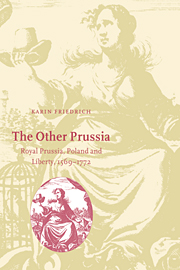Book contents
- Frontmatter
- Contents
- Preface
- Gazetteer
- Glossary
- List of abbreviations
- Map 1
- Map 2
- 1 Introduction
- 2 The origins of Royal Prussia
- 3 Royal Prussia and urban life in the Polish-Lithuanian Commonwealth
- 4 History, myth and historical identity
- 5 Political identity in the cities of Royal Prussia and the meaning of liberty (1650–1720)
- 6 Loyalty in times of war
- 7 Divergence: the construction of rival Prussian identities
- 8 Centre versus province: the Royal Prussian cities during the Great Northern War
- 9 Myths old and new: the Royal Prussian Enlightenment
- 10 Conclusion
- Bibliography
- Index
- CAMBRIDGE STUDIES IN EARLY MODERN HISTORY
10 - Conclusion
Published online by Cambridge University Press: 22 September 2009
- Frontmatter
- Contents
- Preface
- Gazetteer
- Glossary
- List of abbreviations
- Map 1
- Map 2
- 1 Introduction
- 2 The origins of Royal Prussia
- 3 Royal Prussia and urban life in the Polish-Lithuanian Commonwealth
- 4 History, myth and historical identity
- 5 Political identity in the cities of Royal Prussia and the meaning of liberty (1650–1720)
- 6 Loyalty in times of war
- 7 Divergence: the construction of rival Prussian identities
- 8 Centre versus province: the Royal Prussian cities during the Great Northern War
- 9 Myths old and new: the Royal Prussian Enlightenment
- 10 Conclusion
- Bibliography
- Index
- CAMBRIDGE STUDIES IN EARLY MODERN HISTORY
Summary
With the partitions of Poland-Lithuania, Sarmatian mythology lost its function as an umbrella identity for the various nations of the Commonwealth. Loyalty to a constitution, a common history and a common political culture receded into the background, to be replaced by a definition of Polish nationality in terms of language and ethnicity. After the partitions, the discrimination and chicanery against Polish-speakers and Catholics who, under the new regime of Berlin and Königsberg, had to suffer from harsher measures of expropriation and higher taxation than Protestants, and their total exclusion from civil service careers, contributed to the increasing polarisation between ‘Poles’ and ‘Germans’. The dissolution of the Polish-Lithuanian state made it even easier to mark the difference between a ‘Western, civilised’ part of Enlightenment Europe and a ‘barbarian’ East. Beyond that line was no longer just the Ottoman Empire, but the border was redrawn on the Memel and the Vistula rivers.
The national antagonism between Germans and Poles was not invented in 1772; in the past, Prussian historians had emphasised the German origins of the Teutonic Knights and of a majority of the population who had settled in the Prussian lands for centuries. From the sixteenth century language had been an issue, even in parliamentary debates, and many burghers had been eager to retain the use of German as one of their fundamental privileges.
- Type
- Chapter
- Information
- The Other PrussiaRoyal Prussia, Poland and Liberty, 1569–1772, pp. 217 - 221Publisher: Cambridge University PressPrint publication year: 2000



